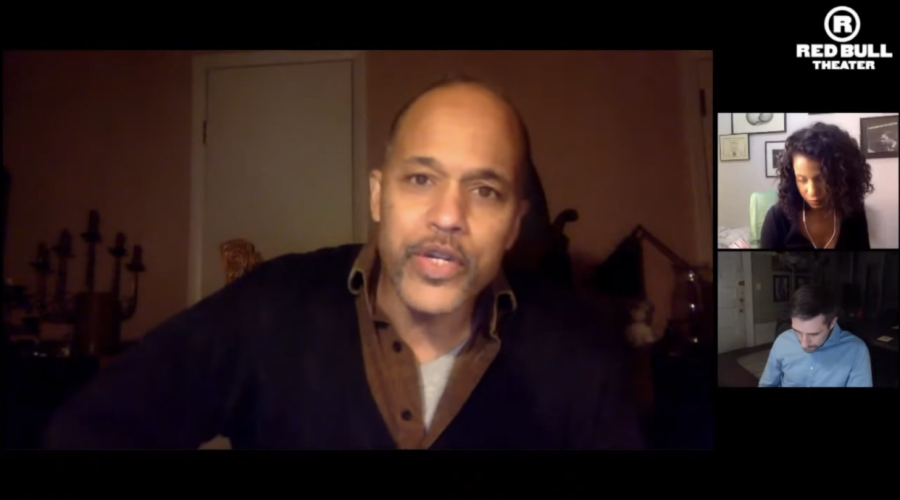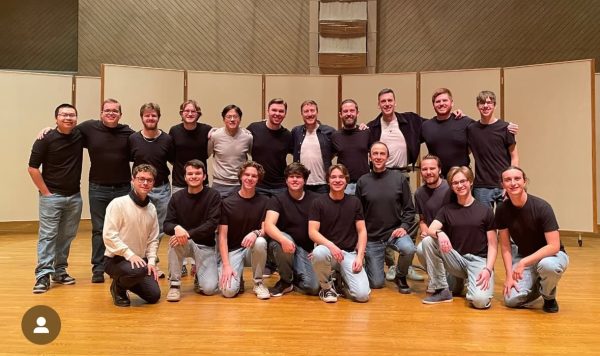Keith Hamilton Cobb’s American Moor Addresses Racism in Shakespeare and Theater
On Monday, October 12th, members of the Luther community tuned into a livestream production of Keith Hamilton Cobb’s American Moor, which was produced by the Red Bull Theater in New York City. Along with Cobb, actors Josh Tyson and Ayana Workman joined the zoom call for a live benefit reading of Cobb’s play as part of the theater’s series “Othello 2020.” This series evaluates the relationship of William Shakespeare’s classic work to contemporary issues of racial discrimination in his plays and in the world of theater. As audience members waited for the reading to begin, the live chat was filled with expressions of excitement.
“This is perfect timing,” one commenter wrote, and many others echoed this remark about the timeliness of Cobb’s play. American Moor’s critique of modern theater and its relation to race coincides with many critiques of various other institutions––critiques currently at the very forefront of public discourse. Workman, who reads the stage directions in the live zoom production, prefaces the play’s setting.
“Place: an American stage, in an American theater, on an American street, in an American town. Time: even now, now, very now,” Workman read.
Because Cobb’s critique has not been so made public until very recently in modern history, discussions of racism in Shakespeare’s traditionally beloved plays and within the entertainment sphere at large are novel. Othello has long been central to conversations of race and inclusivity in the theater. One of Shakespeare’s tragedies, the story follows Othello, a thriving Black Venetian army captain, and his marriage to Desdemona, a white senator’s daughter, focusing on the societal upheaval their marriage causes.
The play has been performed for centuries, originally with white actors in blackface. Now, the production is a staple in the Shakespeare canon, often seen as an opportunity to diversify a theater’s season. Portraying an audition for the role of Othello along with the inner thoughts of a Black male actor in America, Cobb challenges the idea that Othello’s experiences are unique to him and his time, instead of essential universal truths relating to Black men regardless of time and place due to the persistent racism of both medieval and modern society.
“Older white actors would look me up and down and then with a fatherly wink say ‘so, have you played him?’ no longer even needing to give him a name, but you can bet they weren’t talking about Julius Caesar,” Cobb said, lamenting how society prescribes him with the destiny of playing Othello solely because he is Black.
In the show, the director calls for anger and emotion from the actor, ignoring his input as a person with deep connections to Othello in pursuit of a traditionally Euro-centric, white tinted portrayal. Professor Kate Narveson, who teaches a class on Shakespeare, assigned her students the play. When asked about how Shakespeare might view Cobb’s play, she shared that both playwrights would likely get along.
“I do think he and Cobb’s character would hit it off, they share a love of words and their power, and share a keenness of perception about how limited and unimaginative people can be,” Professor Narveson said. “The way the play dramatized a highly intelligent actor attempting to respond with grace, tolerance, good humor, and a degree of resignation despite years of being patronized and stereotyped in ways that blocked him from the acting opportunities his talent deserved. His anger at the injustice and humiliation bursts out, yet he seems able not to let it embitter him.”
Cobb’s character struggles with the comments of the white director, confronting it in his internal monologue. He reminds the audience that Black men are traditionally portrayed as more dangerous, more violent, and angrier.
“Do I paint Othello’s dignified countenance as a facade which so easily crumbles turning a great and graceful Black man into a monster suggesting that he––we––are never really that great and graceful at all,” Cobb read. “He is wholly human, but he is Black, and to be Black here is to be more misread, misrepresented, misinterpreted, more misunderstood.”
Even in spaces where it is claimed that all are welcome and equal, racism persists in insidious ways. Cobb explained that options are limited when it is implied that talent is valued over all else. To him, the concept of colorblindness erases the idea that our differences are important, and should be celebrated, rather than buried in misrepresentation.






